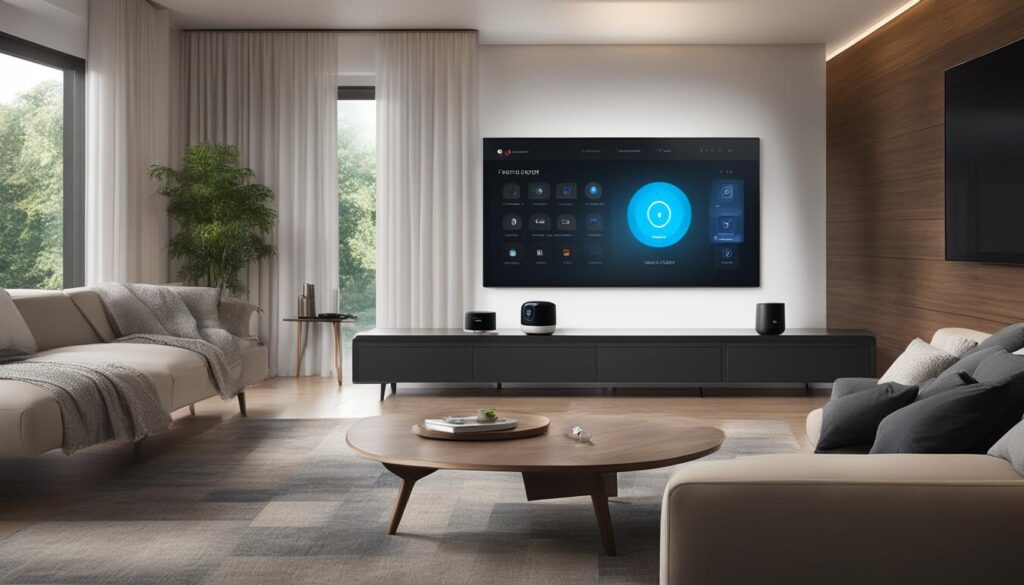Welcome to my blog post about home automation integration and how it can enhance your smart home experience. In today’s connected world, smart devices have become an integral part of our daily lives. From voice assistants to smart thermostats, home automation offers a seamless and convenient way to control and manage these devices from a centralized platform. In this article, I will explore the importance of integrating home automation with other smart devices and platforms, and how it can transform your living space into a connected and efficient home.

Home automation platforms serve as the backbone of a smart home system, providing the software framework that enables connectivity and control. These platforms allow homeowners to manage multiple aspects of their home, such as lighting, security, and entertainment, through a single interface. By integrating various smart devices and platforms, homeowners can create a fully customized and integrated smart home ecosystem.
When it comes to home automation integration, compatibility is key. It is essential to select smart devices and platforms that work seamlessly together, ensuring a smooth and hassle-free user experience. This compatibility ensures that all your devices can communicate with each other and be controlled from a single platform, eliminating the need for multiple apps and interfaces.
Key Takeaways:
- Home automation integration allows for seamless communication and control between different smart devices.
- Smart home platforms serve as the software framework that controls and manages connected devices.
- Choosing the right smart home platform is crucial for a streamlined and convenient smart home experience.
- Systems engineering plays a significant role in the development and implementation of smart home automation systems.
- Systems engineering will continue to shape the future of smart homes, enabling enhanced efficiency and connectivity.
What is a Smart Home Platform, and Do I Need One?
A smart home platform is a software framework that controls and manages multiple devices from various manufacturers. It serves as a centralized control system for your smart home automation. With a smart home platform, you can conveniently organize and control all your connected devices through a single app. From lighting and security systems to thermostats and entertainment devices, a smart home platform allows you to manage and automate multiple aspects of your home.
Smart home platforms often require a smart hub and/or a smart speaker as hardware components. These devices enable hands-free voice control, making it easier to interact with your smart home. By integrating a voice assistant, such as Amazon Alexa or Google Assistant, you can control your devices, set up automations, and access information using simple voice commands.
While it is possible to use a smartphone as a smart home platform, adding a dedicated hub or smart speaker enhances the functionality and convenience of your smart home. These devices act as a central control hub, enabling seamless communication among your various smart devices. They also provide additional features like voice control and the ability to group devices together for synchronized actions.
Having a smart home platform is not necessary if you only have a few smart devices that can largely operate independently. However, as you expand your collection of smart devices, a smart home platform becomes essential for efficient control and integration. With a smart home platform, you can create automations based on triggers and commands, allowing your devices to work together in harmony.
Benefits of a Smart Home Platform
A smart home platform offers several advantages:
- Centralized control: Manage and control all your smart devices through a single app or voice commands.
- Automations: Create custom automations to make your devices work together based on specific conditions or triggers.
- Group devices: Synchronize multiple devices to operate simultaneously, enhancing convenience and efficiency.
- Seamless integration: Bring together devices from multiple manufacturers and integrate them seamlessly into your smart home system.
Choosing the Right Smart Home Platform
When selecting a smart home platform, consider the following factors:
- Compatibility with existing devices: Ensure that the platform supports your current smart devices, such as thermostats, security cameras, and door locks.
- Voice assistant compatibility: Choose a platform that aligns with your preferred voice assistant, such as Amazon Alexa, Google Assistant, or Apple Siri, to enable voice control.
- Usability and user experience: Look for a platform that is user-friendly and offers a seamless and intuitive interface.
- Multi-manufacturer support: Opt for a platform that works with devices from various manufacturers, providing flexibility and compatibility.
By considering these factors, you can select the right smart home platform that meets your needs and preferences, ensuring a seamless and integrated smart home experience.
Choosing the Right Smart Home Platform for You
When it comes to creating a smart home, selecting the right smart home platform is essential. With a wide range of options available, such as Apple Home, Google Home, Amazon Alexa, and Samsung SmartThings, finding the platform that suits your needs can seem overwhelming. However, considering a few key factors can help simplify the decision-making process.
Determine Smartphone Ecosystem Compatibility
The first step in choosing a smart home platform is to consider the smartphone ecosystem you use. If you already own an Apple iPhone, Apple Home may be the most seamless choice, as it is specifically designed to integrate with iOS devices. On the other hand, Google Home works well with Android smartphones, providing an intuitive and cohesive user experience.
Evaluate Existing Device Compatibility
Another important factor in selecting a smart home platform is evaluating the compatibility of your existing devices. If you already have smart devices like thermostats, security cameras, or lights, it is crucial to choose a platform that can easily integrate and control them. For example, if you have Amazon Alexa-enabled devices, opting for a platform that supports Alexa voice control would be beneficial.
Consider Voice Assistant Compatibility
Voice control is becoming increasingly popular in smart homes. Determine your favorite voice assistant, whether it’s Amazon Alexa, Google Assistant, or another option, and choose a platform that seamlessly integrates with your preferred voice assistant. This compatibility ensures that you can control your smart home with simple voice commands.
Find Your Ideal Platform
By considering your smartphone ecosystem, existing device compatibility, and favorite voice assistant, you can narrow down the options and find the ideal platform for your smart home. Each platform offers its own unique features and benefits, so take your time to research and explore the possibilities.
Remember, creating a smart home is an investment in convenience and efficiency, so selecting the right platform is crucial to a seamless and integrated smart home experience.

| Smart Home Platform | Smartphone Ecosystem Compatibility | Existing Device Compatibility | Voice Assistant Compatibility |
|---|---|---|---|
| Apple Home | iOS | Compatible with Apple devices | Siri voice control |
| Google Home | Android | Compatible with a wide range of devices | Google Assistant voice control |
| Amazon Alexa | Multiple | Compatible with various devices and brands | Amazon Alexa voice control |
| Samsung SmartThings | Multiple | Compatible with select devices and brands | SmartThings voice control |
Benefits of Systems Engineering in Smart Home Automation
Systems engineering plays a crucial role in the development and implementation of smart home automation systems. Through the integration of various devices and technologies, systems engineering enables homeowners to create a seamless and efficient living environment that enhances convenience, comfort, and security.
One of the key benefits of systems engineering in smart home automation is device integration. By utilizing systems engineering principles, different smart devices can be connected and controlled through a centralized platform. This allows homeowners to manage multiple aspects of their home, such as lighting, temperature, security, and entertainment systems, with ease and simplicity.
Resource management is another crucial aspect that systems engineering addresses in smart home automation. By optimizing energy consumption and reducing wastage, systems engineering promotes energy efficiency and sustainability. Through intelligent algorithms and automation, homeowners can have better control over their energy usage, resulting in cost savings and environmental conservation.
Enhancing security is a top priority in smart home automation, and systems engineering plays a significant role in achieving this. By integrating various security devices, such as surveillance cameras, door locks, and motion sensors, homeowners can monitor and control their homes remotely. Systems engineering ensures the seamless operation and communication between these security components, providing peace of mind and a heightened sense of security.
Scalability is also a key advantage of systems engineering in smart home automation. As technology continues to evolve, homeowners may want to add new devices or upgrade existing ones. Systems engineering allows for easy integration of new technologies without disrupting the entire system. This scalability ensures that smart homes can adapt to changing needs and preferences, providing homeowners with the flexibility to customize and expand their automation capabilities.
Ultimately, systems engineering plays a vital role in creating a reliable and user-friendly smart home automation experience. By focusing on system integration, resource management, security, scalability, and overall user experience, systems engineering enhances the functionality and effectiveness of smart homes. With systems engineering in place, homeowners can enjoy the benefits of a seamlessly integrated and personalized smart home automation system.
The Future of Systems Engineering in Smart Homes
As we look ahead, it is clear that systems engineering will continue to shape the future of smart homes. With its ability to enhance efficiency, connectivity, and overall user experiences, systems engineering plays a pivotal role in the advancement of home automation.
By integrating various technologies and subsystems, systems engineering enables optimized processes and real-time data sharing, leading to a seamless and interconnected smart home ecosystem. This connectivity allows homeowners to better control and manage their homes, enhancing convenience and productivity.
Moreover, systems engineering contributes to sustainability and environmental conservation in smart homes. Energy management systems enable efficient resource usage, minimizing waste and lowering energy consumption. Waste management solutions and smart agriculture further promote sustainable living, ensuring a greener future.
Looking beyond the confines of our homes, systems engineering extends its influence to autonomous vehicles, artificial intelligence, and the Internet of Things (IoT). It facilitates the integration and operation of these emerging technologies, resulting in more advanced and intelligent smart home automation systems.
The future of systems engineering is promising, as it plays a vital role in the evolution of smart homes and the technologies that surround them. Through enhanced efficiency, connectivity, and sustainability, systems engineering is set to create a more seamless and immersive user experience. As we embrace a future driven by autonomous vehicles, artificial intelligence, and the Internet of Things, systems engineering will be the cornerstone that ensures the successful integration and operation of these technologies within our smart homes, making our lives more efficient, sustainable, and connected.
FAQ
How does home automation integrate with other smart devices and platforms?
Home automation integrates with other smart devices and platforms by allowing seamless communication and control between different devices. This integration enables homeowners to manage multiple aspects of their home through a centralized interface.
What is a smart home platform, and do I need one?
A smart home platform is a software framework that controls and manages multiple devices from multiple manufacturers. It allows homeowners to organize their connected devices in one app and create automations based on triggers and commands. While not necessary for a few independent smart gadgets, a smart home platform becomes essential for controlling all devices through one app, integrating them into automations, and having voice control capabilities.
How do I choose the right smart home platform for me?
When choosing a smart home platform, consider factors such as your smartphone ecosystem, device compatibility, and favorite voice assistant. Select a platform that works seamlessly with your existing devices and integrates well with your preferred voice assistant for a fully integrated and customized smart home system.
What are the benefits of systems engineering in smart home automation?
Systems engineering plays a crucial role in the development and implementation of smart home automation systems. It ensures the seamless integration of devices, promotes efficient resource management, enhances security, and allows for easy scalability, resulting in a reliable and user-friendly smart home automation experience.
What is the future of systems engineering in smart homes?
Systems engineering will continue to shape the future of smart homes by enabling enhanced efficiency, connectivity, and user experiences. It will play a significant role in promoting sustainability and environmental conservation, advancing autonomous vehicles, artificial intelligence, and the Internet of Things, ensuring seamless integration and operation of smart home automation systems.




